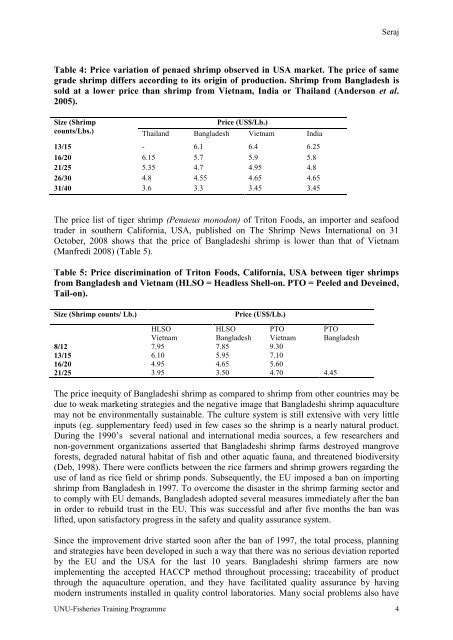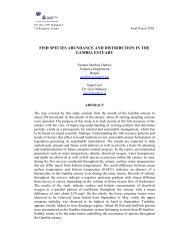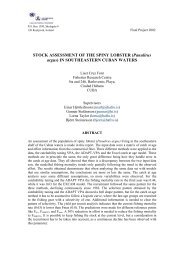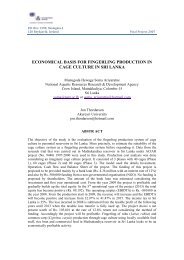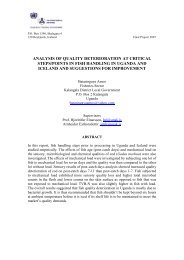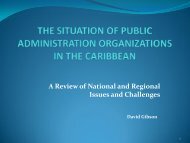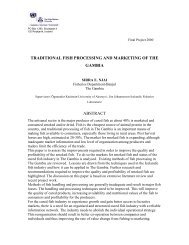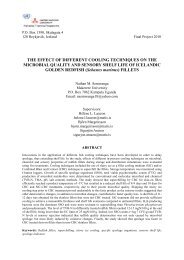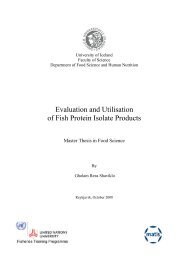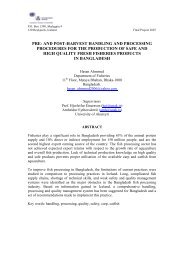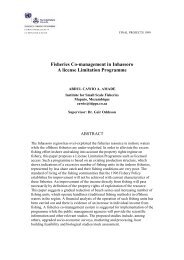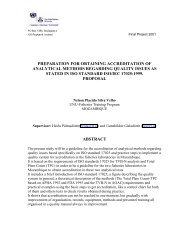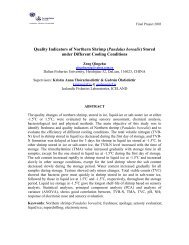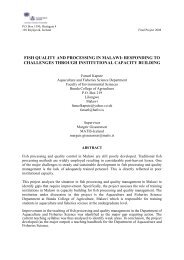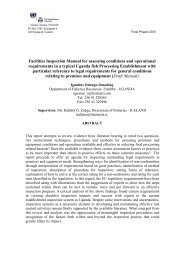a compliance study of Bangladesh shrimp aquaculture - The United ...
a compliance study of Bangladesh shrimp aquaculture - The United ...
a compliance study of Bangladesh shrimp aquaculture - The United ...
Create successful ePaper yourself
Turn your PDF publications into a flip-book with our unique Google optimized e-Paper software.
SerajTable 4: Price variation <strong>of</strong> penaed <strong>shrimp</strong> observed in USA market. <strong>The</strong> price <strong>of</strong> samegrade <strong>shrimp</strong> differs according to its origin <strong>of</strong> production. Shrimp from <strong>Bangladesh</strong> issold at a lower price than <strong>shrimp</strong> from Vietnam, India or Thailand (Anderson et al.2005).Size (Shrimpcounts/Lbs.)Price (US$/Lb.)Thailand <strong>Bangladesh</strong> Vietnam India13/15 - 6.1 6.4 6.2516/20 6.15 5.7 5.9 5.821/25 5.35 4.7 4.95 4.826/30 4.8 4.55 4.65 4.6531/40 3.6 3.3 3.45 3.45<strong>The</strong> price list <strong>of</strong> tiger <strong>shrimp</strong> (Penaeus monodon) <strong>of</strong> Triton Foods, an importer and seafoodtrader in southern California, USA, published on <strong>The</strong> Shrimp News International on 31October, 2008 shows that the price <strong>of</strong> <strong>Bangladesh</strong>i <strong>shrimp</strong> is lower than that <strong>of</strong> Vietnam(Manfredi 2008) (Table 5).Table 5: Price discrimination <strong>of</strong> Triton Foods, California, USA between tiger <strong>shrimp</strong>sfrom <strong>Bangladesh</strong> and Vietnam (HLSO = Headless Shell-on. PTO = Peeled and Deveined,Tail-on).Size (Shrimp counts/ Lb.)Price (US$/Lb.)HLSOVietnamHLSO<strong>Bangladesh</strong>PTOVietnamPTO<strong>Bangladesh</strong>8/12 7.95 7.85 9.3013/15 6.10 5.95 7.1016/20 4.95 4.65 5.6021/25 3.95 3.50 4.70 4.45<strong>The</strong> price inequity <strong>of</strong> <strong>Bangladesh</strong>i <strong>shrimp</strong> as compared to <strong>shrimp</strong> from other countries may bedue to weak marketing strategies and the negative image that <strong>Bangladesh</strong>i <strong>shrimp</strong> <strong>aquaculture</strong>may not be environmentally sustainable. <strong>The</strong> culture system is still extensive with very littleinputs (eg. supplementary feed) used in few cases so the <strong>shrimp</strong> is a nearly natural product.During the 1990’s several national and international media sources, a few researchers andnon-government organizations asserted that <strong>Bangladesh</strong>i <strong>shrimp</strong> farms destroyed mangroveforests, degraded natural habitat <strong>of</strong> fish and other aquatic fauna, and threatened biodiversity(Deb, 1998). <strong>The</strong>re were conflicts between the rice farmers and <strong>shrimp</strong> growers regarding theuse <strong>of</strong> land as rice field or <strong>shrimp</strong> ponds. Subsequently, the EU imposed a ban on importing<strong>shrimp</strong> from <strong>Bangladesh</strong> in 1997. To overcome the disaster in the <strong>shrimp</strong> farming sector andto comply with EU demands, <strong>Bangladesh</strong> adopted several measures immediately after the banin order to rebuild trust in the EU. This was successful and after five months the ban waslifted, upon satisfactory progress in the safety and quality assurance system.Since the improvement drive started soon after the ban <strong>of</strong> 1997, the total process, planningand strategies have been developed in such a way that there was no serious deviation reportedby the EU and the USA for the last 10 years. <strong>Bangladesh</strong>i <strong>shrimp</strong> farmers are nowimplementing the accepted HACCP method throughout processing; traceability <strong>of</strong> productthrough the <strong>aquaculture</strong> operation, and they have facilitated quality assurance by havingmodern instruments installed in quality control laboratories. Many social problems also haveUNU-Fisheries Training Programme 4


